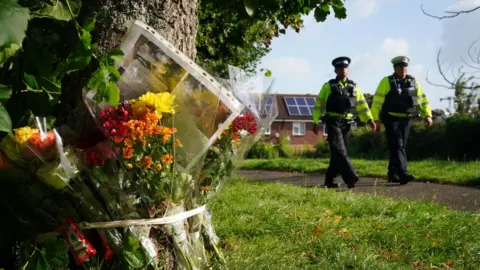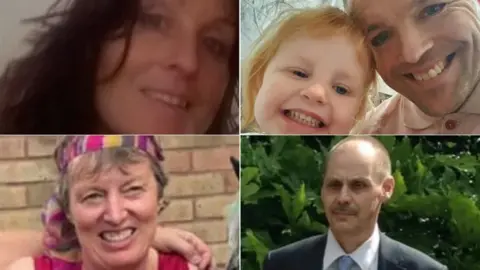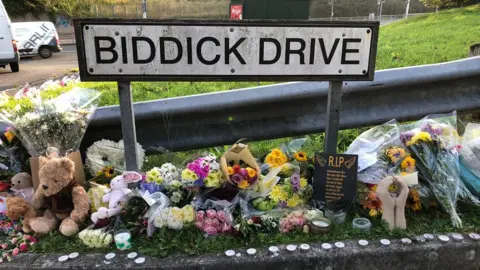Plymouth shooting inquest: Families call for tougher shotgun laws
 BBC
BBCFamilies of five people killed by a gunman are calling for tougher laws on shotgun licences, an inquest has heard.
Jake Davison, 22, used a legally held shotgun to kill his mother Maxine Davison and four others before killing himself in Plymouth in August 2021.
The inquest into their deaths heard licensing was less stringent for shotguns than for rifles.
Dominic Adamson, representing the families, said there was "no sensible justification" for the difference.
 Unknown/The Anchorage/Handout
Unknown/The Anchorage/HandoutInquests are taking place into the deaths of Mrs Davison, 51, three-year-old Sophie Martyn, her father, Lee, 43, Stephen Washington, 59, and Kate Shepherd, 66.
They were shot and killed by Davison in the Keyham area of Plymouth where he lived.
Mr Adamson said it was the view of his clients there was "no good reason for the distinction to exist" between shotgun and rifle licensing.
The Home Office's head of firearms policy, Nicholas Hunt, told jurors at the hearing at Exeter Racecourse there were historic reasons for the differences.
Shotguns were primarily seen as a tool used by farmers while firearms like rifles were more for sporting and competitive reasons.
The Home Office was considering bringing the two in line with each other "subject to anything the coroner here might suggest", he said.
The inquest heard applications for a firearms certificate required two references, while shotgun licences only required one referee and the applicant did not need to show good reason for their application in the same way.

The inquest heard while there was a requirement shotguns were safely stored, it was unlikely to be possible for police to put specific conditions on licences restricting where the weapon was stored.
Officers can impose conditions on where rifles and other firearms are stored.
The inquest previously heard how recommendations made in the wake of the Dunblane massacre for licensing staff training were not followed in the Devon and Cornwall force.
Mr Adamson said a quarter of a century later there was "still no accredited training in place".
He asked Mr Hunt: "Do you accept there were failures by successive governments to implement that recommendation?"
Mr Hunt said he did not.
He said the Home Office provided guidance in 2002 and training was provided "throughout that period of time led by individual police forces", which was available to other forces.
The inquest also heard about a national review of firearms policy, which warned of a need for change in 2015.
Mr Adamson said the Targeting the Risk report, which warned of another tragedy, had "highlighted the long-standing need for a national training package", which still did not exist.
Mr Hunt said it would have been for the national policing lead for firearms licensing to take forward, not the Home Office.
Mr Adamson asked if changing the law meant conditions could be brought in that would mean weapons could only be acquired for specific purposes, limits could be placed on the type of weapon purchased and limits could be placed on the type and quantity of ammunition purchased.
Mr Hunt said that was correct but those types of conditions were not available for shotguns under the current legislation.
Mr Adamson asked if that was a way a change of legislation could make a meaningful change.
Mr Hunt agreed it was.
The inquest continues.

Follow BBC News South West on Twitter, Facebook and Instagram. Send your story ideas to [email protected].
